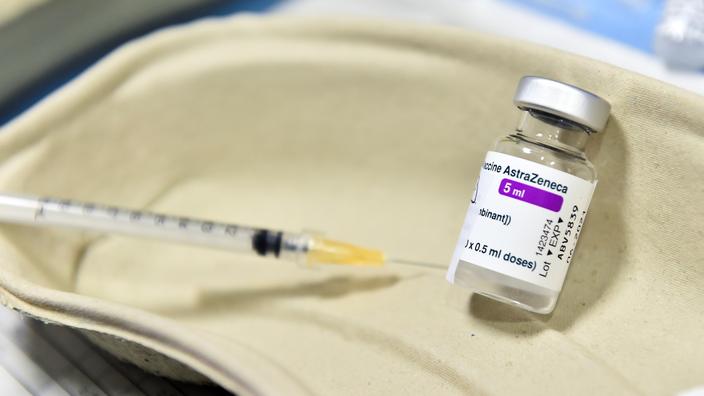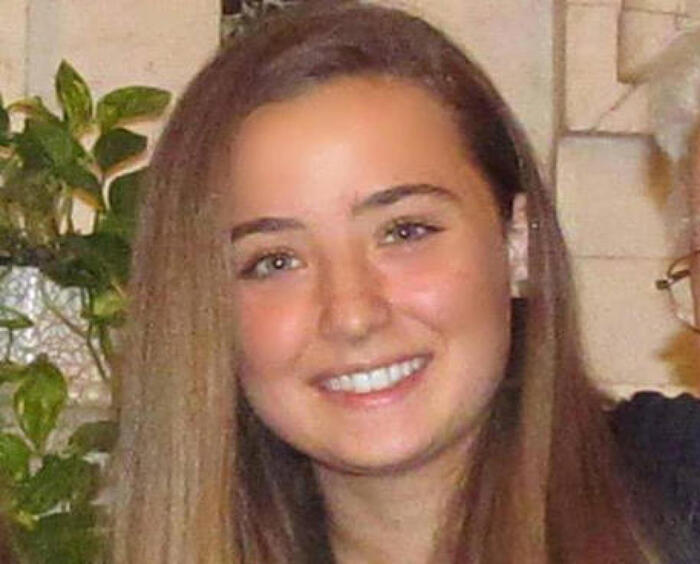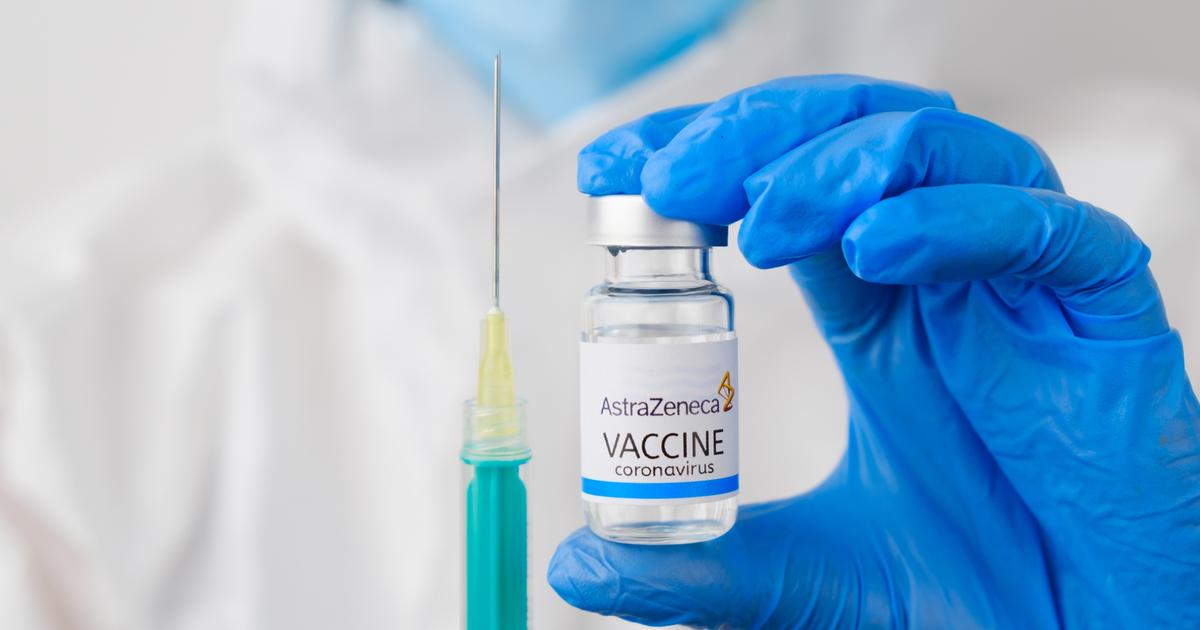"I didn't feel anything even though I'm a little cozy".
In an attempt to reassure the French about the AstraZeneca vaccine, the Prime Minister received his first dose of the vaccine on Friday.
Jean Castex wanted to set an example while the use of AstraZeneca has been authorized again in France since Friday.
Deemed
"safe and effective"
by the European Medicines Agency (EMA), in an opinion issued after the suspension of its use by fifteen European countries, including France, the vaccine from the Anglo-Swedish laboratory still raises many questions .
Le Figaro
takes stock.
To discover
Test, isolation: the procedure to follow in the event of a suspicion of Covid-19
Read also: Covid-19: who can be vaccinated, where, by whom and with what product?
Why was the AstraZeneca vaccine suspended initially?
The first concerns related to this vaccine date back to March 8 when Austria suspended a batch after the death of a 49-year-old nurse from
"serious blood clotting problems"
after receiving the AstraZeneca vaccine.
Denmark is then the first European country to completely suspend vaccination, on March 11, the Danish health agency worrying about
"reports of serious cases of blood clots".
In the process, about fifteen European countries suspend the use of this vaccine, including France, Germany and Italy, Monday.
The precautionary principle is invoked by Emmanuel Macron to justify this decision.
The French head of state is awaiting an opinion from the European Medicines Authority (EMA) issued on March 18.
The PRAC, the pharmacovigilance system of the EMA, therefore studied the
"different types of risk of thrombotic complications (phlebitis, pulmonary embolism, etc.)"
and
"disseminated intravascular coagulations and cerebral thrombophlebitis"
in people who have received the vaccine. .
The EMA finally estimated in its opinion of March 18, that the vaccine was
"not associated"
with a higher risk of blood clot, deeming it
"safe and effective".
Read also: The AstraZeneca vaccine deemed safe and effective by European experts
What are its side effects?
According to the fifth ANSM pharmacovigilance report on the side effects of AstraZeneca published on March 19, since the start of the vaccination, 4,184 cases of side effects have been detected.
In the majority of cases, these are patients affected by flu-like symptoms such as fever, headaches or body aches.
The ANSM also notes that
"a possible link with two very rare forms of blood clots (disseminated intravascular coagulation (DIC) and thrombosis of the cerebral venous sinuses), associated with a deficiency in blood platelets cannot be excluded at this stage" .
On March 12, the European Medicines Agency also indicated that severe allergies should be added to the list of side effects.
Thursday, March 18 Emer Cooke, the president of the EMA, clarified that during the
"investigation and the examination, we started to see a small number of cases of rare and unusual but very rare bleeding disorders. serious, which then triggered a more focused examination "
before adding:
" Based on the available evidence, and after days of in-depth analysis "
of the data,
" we still cannot definitively rule out a link between these cases. and the vaccine ”
.
Pending new information, the EMA therefore recommends adding these potential risks to the treatment information.
Why was an age limit set at 55 by the Haute Autorité de santé?
If the High Authority of Health has given the green light to a resumption
"without delay"
of the vaccination campaign with AstraZeneca, it nevertheless sets an age limit in its recommendations.
The organization notes, in fact, that the European regulator
“considers that the possibility of a link between the vaccine, and cases of disseminated intravascular coagulation (DIC) and cerebral venous thrombosis (CVT) cannot be ruled out at this day.
As of March 16, 2021, 18 cases of CVD and 7 cases of DIC have been reported to the EMA by Member States and the UK out of around 20 million people vaccinated with the AstraZeneca vaccine ”.
Of these 25 cases, 9 people died.
However,
“almost all of these cases occurred in people under 55 years of age, the majority of whom were women”.
Because of this "
possible increased risk"
and "
given the progress of the vaccination campaign, which will concern elderly populations over the next two months, and the existence of alternatives for the youngest, the HAS recommends this stage of using the AstraZeneca vaccine only for people aged 55 and over, who constitute the vast majority of current priority people ”.
Read also: The AstraZeneca vaccine reserved for over 55s
AstraZeneca has previously been recommended for people aged 50 and over.
In an email sent to caregivers, consulted by Le
Figaro
, the Directorate General of Health adds that
"the opinion of the HAS will be reviewed soon in close collaboration with the National Medicines Safety Agency (ANSM), depending on the data of pharmacovigilance to come, with more hindsight on the AstraZeneca vaccine, in particular in people under 55 years of age ”.
Will caregivers under the age of 55 need to use another vaccine?
Yes, replies the DGS in its email.
“Pending further data, HAS therefore recommends using mRNA vaccines in people who are eligible for vaccination under the age of 55.
This means that health professionals under the age of 55 are invited to go to vaccination centers to be vaccinated with Pfizer and Moderna vaccines
,
”it
is written.
Some people under 55 are now eligible for vaccination in addition to health professionals such as people over 50 with one or more co-morbidities or people with disabilities, regardless of their condition. age, accommodated in specialized establishments.
All these people will therefore also have to change their vaccines.
Can people under 55 who have already received a first dose be able to receive a second dose of AstraZeneca?
HAS has not yet decided.
"Concerning people under 55 years of age who have already received a first dose of the AstraZeneca vaccine, the HAS will very soon position itself on the methods of administering the second dose"
, details the DGS.
An interval of 12 weeks must, in addition, be respected between the two doses, recalled the HAS in its opinion.
Is the efficacy of the vaccine called into question?
No, according to the EMA which estimated Thursday that
"the benefits of vaccines continue to outweigh the risks."
Same speech from the WHO this Friday.
"The AstraZeneca vaccine (...) continues to have a positive benefit-risk profile, with enormous potential to prevent infections and reduce deaths worldwide,"
wrote the Global Advisory Committee on Vaccine Safety (GACVS ) of the WHO, in a press release.
The vaccine's efficacy rate is around 60%, based on clinical findings.
While this is a much lower rate than that of messenger RNA vaccines, around 90%, this is still sufficient to combat the symptomatic forms.
According to a recent Scottish study - based on weekly data on vaccination, hospital admissions, tests and deaths - the vaccine from the Anglo-Swedish laboratory has reduced severe forms by 94% for those who had received this treatment.
Against 85% for Pfizer.
Why haven't all European countries adopted the same strategy?
While several European countries like France, Germany or Italy, have relaunched their vaccination campaigns with AstraZeneca, the Nordic countries are more cautious.
Sweden and Denmark have therefore decided to carry out additional evaluations before authorizing this treatment again.
Finland, which had not yet suspended AstraZeneca, even decided this Friday to interrupt its campaign
"under the precautionary principle".
Read also: Vaccines: how Europe fell behind
The vocation of the EMA is to authorize or not a vaccine in the countries of the European Union.
For the rest, national sovereignty remains the rule, each country can set up its own rules, hence different strategies between countries which follow the recommendations of the EMA and those which deviate from them.








